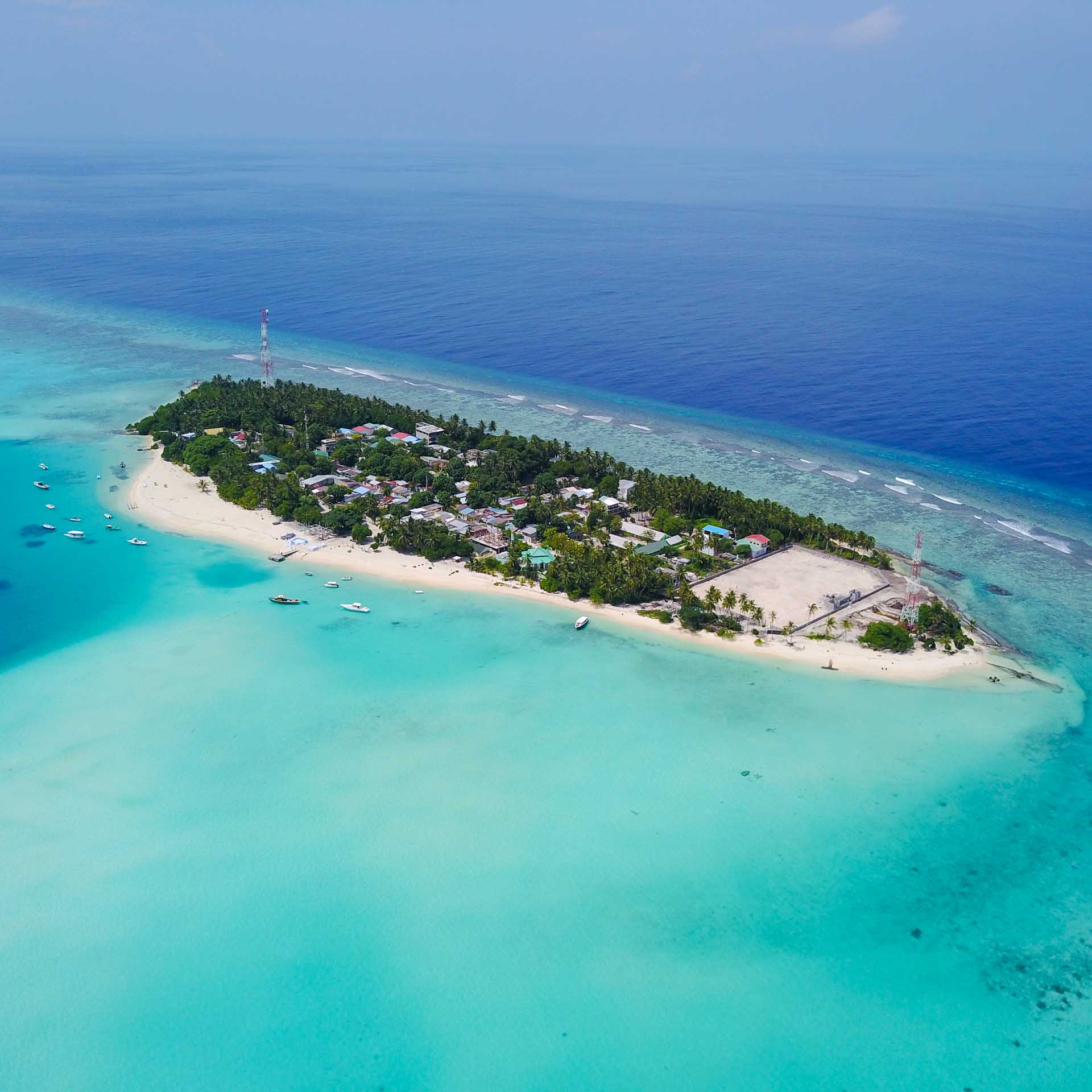The most commonly asked questions about travelling and diving in the Maldives.
Still haven’t found the info that you’re looking for?
Drop us a line at [email protected] or get in touch via our social media channels!
Is Fulidhoo Dive on a resort island or on a local island?
Fulidhoo Dive is located on the local island of Fulidhoo in Vaavu Atoll. The island is inhabited by about 400 people. The island is just over an hour away from the international airport by speedboat.
How is a local island different to a resort island?
Resort islands are island occupied by one single hotel. Local islands are where regular Maldivian people live, work and go to school. In the Maldives, different laws apply to resort and local islands. Whereas pork and alcohol are permitted on resort islands, they are not permitted in local islands, where Maldivians live. Also, guests are advised to cover from shoulder to knees in the public areas of Fulidhoo, although are welcome to wear swimwear on the allocated guest beach.
The one island one hotel model makes staying in a resort extremely expensive. And in resort islands, guests can not experience what it is really like to live in the Maldives. In local islands, guests can mingle with the locals and live like them. Visitors are welcomed into the community and have a chance to see what island life involves. You’ll see fishermen leaving to catch dinner and returning to sell their catch on the jetty, you’ll see women cultivating fruit and vegetables in their gardens, children playing in the street and young adults drumming and dancing in the evenings. You’ll see that life has changed very little in these islands over the past century.
How is a local island different to a resort island?
Resort islands are island occupied by one single hotel. Local islands are where regular Maldivian people live, work and go to school. In the Maldives, different laws apply to resort and local islands. Whereas pork and alcohol are permitted on resort islands, they are not permitted in local islands, where Maldivians live. Also, guests are advised to cover from shoulder to knees in the public areas of Fulidhoo, although are welcome to wear swimwear on the allocated guest beach.
The one island one hotel model makes staying in a resort extremely expensive. And in resort islands, guests can not experience what it is really like to live in the Maldives. In local islands, guests can mingle with the locals and live like them. Visitors are welcomed into the community and have a chance to see what island life involves. You’ll see fishermen leaving to catch dinner and returning to sell their catch on the jetty, you’ll see women cultivating fruit and vegetables in their gardens, children playing in the street and young adults drumming and dancing in the evenings. You’ll see that life has changed very little in these islands over the past century.
How is a local island different to a resort island?
Resort islands are island occupied by one single hotel. Local islands are where regular Maldivian people live, work and go to school. In the Maldives, different laws apply to resort and local islands. Whereas pork and alcohol are permitted on resort islands, they are not permitted in local islands, where Maldivians live. Also, guests are advised to cover from shoulder to knees in the public areas of Fulidhoo, although are welcome to wear swimwear on the allocated guest beach.
The one island one hotel model makes staying in a resort extremely expensive. And in resort islands, guests can not experience what it is really like to live in the Maldives. In local islands, guests can mingle with the locals and live like them. Visitors are welcomed into the community and have a chance to see what island life involves. You’ll see fishermen leaving to catch dinner and returning to sell their catch on the jetty, you’ll see women cultivating fruit and vegetables in their gardens, children playing in the street and young adults drumming and dancing in the evenings. You’ll see that life has changed very little in these islands over the past century.
What’s the food like in Fulidhoo?
Most of the guests eat the majority of their meals in their guesthouse. The guesthouses here offer a mixture of local, regional and European dishes. Think local curries, fresh fish steak and BBQ alongside pasta, chicken, and vegetable dishes. Food is a little limited but it’s tasty!
In the local cafés you can also try dishes such as Nasi Goreng, fried rice and the local afternoon snack hedhika, which is a variety of fried savoury treats. In the local shops you can buy fruits, snacks, ice cream, soft drinks and cup noodles.
The local fruit is delicious, too – bananas, papaya, coconut and watermelon. Yum!
Travellers should expect limited options in Fulidhoo but can still eat extremely well.
If you are vegan, please contact us and we will recommend the guesthouses that are most suited to catering to your dietary requirements.
I’m on a budget – is a local island a good choice for me?
The resorts in the Maldives are notoriously expensive so staying in a local island is a great choice for mid-budget travellers. There are some excellent guesthouses in Fulidhoo and most come in at well under 100$ per night per room. This means you can allocate a larger part of your budget for activities – great news for divers! It should be noted that domestic flights are also very pricey in Maldives so the fact that Fulidhoo is a boat-ride from the airport is a big plus too.
Do I need to get any shots of vaccinations before visiting the Maldives?
No! Unlike other parts of Asia, you do not need any vaccinations for visiting the Maldives.
Is there Malaria in the Maldives?
There is no malaria in the Maldives and therefore you do not need to take any anti-malaria tablets.
What should I pack?
When travelling to the Maldives, you can travel light. When packing, you should remember that Fulidhoo Island is remote so do not rely on picking something up when you get here.
The essentials are:
- Sunscreen – at least factor 30.
- Swimming gear
- All your toiletries
- All medication you currently take and any remedies you may rely on
- Tablet, e-reader or book
- A hat, to protect you from the sun
- Sunglasses
- Flip flops
- Mosquito Repellant
- A rash vest or UV protection top, to wear in the sea.
- Loose, comfortable clothing
- Women should pack clothing that will cover from their shoulders to the knees, for walking around the island, away from the hotel.
- All your dive certification cards and logbooks
- If you wear glasses, we recommend you invest in a prescription mask.
- If you have your own diving gear, we recommend you bring it all. However, we do have equipment to rent.
Also – please be aware that certain items are illegal in the Maldives (see the next question).
Is there anything I’m not allowed to bring into the country?
The following items are strictly prohibited and may result in prosecution:
- Any materials contrary to Islam
- Alcohol
- Pornographic materials
- Pork products
- Narcotics
- Fire arms
- Spear guns
The following questions are specifically about diving:
How long do I have to wait before/after flying to scuba dive?
You must wait 12 hours after flying and 24 hours before flying.
I've never dived before - can I still try?
At Fulidhoo Dive, we are passionate about scuba diving and encourage everyone to give it a try! If you’re not certified, you can join our PADI Discover Scuba Diving (DSD) program to feel what it’s like to breathe underwater.
After your DSD, you can continue your certification to Open Water level.
Please note: In order to scuba dive, please consult the medical form on the PADI website to ensure that you are fit to dive. If you have certain medical history or conditions, you may have to get a doctor’s certificate before being allowed to dive. Please make sure you do this before coming to Fulidhoo.
Do I need a medical certificate to dive?
If you answer YES to any of the medical questions on the PADI medical history form and still wish to dive, you will need a medical certificate from your doctor to show that you are able to.
What courses do you offer?
We offer all PADI courses up to and including Dive Master.
If you have a specialty course in mind, please contact us before arriving to see whether we can instruct that particular specialty.
What languages do you speak?
All of our courses are taught in English and our team are completely fluent. However, we do provide course materials in your language of choice, provided that PADI publishes materials in that language. We stock the course books in a variety of languages in our DC, but do get in touch if you are planning on booking a course with us so that we can ensure we have the right materials for you. The PADI Open Water Diver App is also available to download to your Android or IOS device and this can be downloaded in a number of languages.
Our sales team also speaks English, French and Spanish so if you feel more comfortable emailing us in one of those languages, please feel free.
I haven’t dived for more than six months – will I have to do a refresher dive?
We always recommend that those who haven’t dived for more than six months do an easy dive to begin with. During which, our guide will check that you feel comfortable and might ask you to perform a few simple skills. This will also depend on your number of logged dives.
I don’t want to bring all my dive gear. Can I rent equipment from you?
Yes, we have plenty of rental gear – with sizes going from XXS to XXL in BCDs and XS to XXL in wetsuits.
What wetsuit thickness do you recommend?
The water in the Maldives is warm all year round – to the point where some don’t feel the need to wear a wetsuit at all! However, most people like to wear 3mm shorties.
In the case of a diving accident, where are the nearest medical facilities?
There is a health centre in Fulidhoo that can deal with non-life threatening accidents, such as cuts or stings. For more serious accidents, the regional hospital in Felidhoo is 20 minutes away by speedboat. For suspected DCS incidents, there is a recompression chamber in Bandos Resort, which is 1 hour 15 minutes away by speedboat.
Is dive insurance mandatory?
Yes, you must have dive insurance to dive with us.



